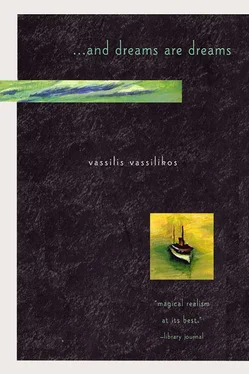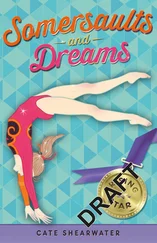Walking back to the hotel, I looked up at the sky, which was so blue it hurt my eyes. I saw the buildings all around me, ancient, Roman, their stones charged with history, beautiful, reddish; I took a deep breath, told myself I was happy, and went up to my room, where Rosa’s perfume remained lightly diffused in the air and where her three roses looked at me with their surprised little heads, as if to say: “You lucky man, you are loved by the hand that brought us to you.”
It must have been around ten in the morning when I sat at my little table in front of the window, ready to start work. I turned on the radio, but I only got the news. During the three days that I had been here, the top story in the news had been organ transplants. (The Pope had only just lifted the ban in this country.) Now the patient, atop his stationary bicycle, told the journalist interviewing him that he was doing just fine, he was feeling wonderful, the stranger’s heart inside him was beating as if it were his own, etc., which, of course, took care of any intention I had of writing (reality always limits the imagination).
I wanted to make my Don Pacifico, who was
living with the heart of Doña Rosita, talk differently. I didn’t wait for the news to end and the classical music to begin: even that can become irritating unless you are totally absorbed in your work. I turned the radio off.
Music only helps you work when you don’t hear it.
But when you’re consciously waiting to grab inspiration by the hair, any intruding sound annoys you. Silence having been re-established in my room, noises started to come in from outside. They were changing the drainpipes in the hotel courtyard, and the talking of the workers, even though it was in a foreign language, distracted me. I closed the window, shutting out the little blue I could see. That put a gag on the voices outside, but now I began to hear the footsteps in the corridor. They were carrying sacks of clean bedclothes and taking away the dirty laundry.
Clearly I was unlucky. And I wasn’t being helped by external circumstances. Even so, the three roses consoled me. I knew that later on I could give Rosa a call, see her, feel reborn in the warmth of her voice.
This should not be taken for love. Not at all. But since I knew that a day is only good if it starts off that way, and since this wasn’t the case and I knew that a night would have to mediate to set things straight, the sweet anticipation of noon, when I would call Rosa, was a consolation for the sick man that I was.
Whenever I feel I can’t express myself, when I feel pressed and pressured, I always have with me a book I love, to dive inside and take heart from. At the time, I had with me Pirandello’s short stories translated into French. Of the three volumes, I had only brought along the second one, so I began a disproportionately long story, more like a novella, which was fine with me because I wanted to lose myself for a long time in my reading.
Then the cannon fire that announces noon made my window shake. I opened the window and saw that not a single cloud had come to darken the satin sky. It was as if the day insisted I go out, and I insisted on sitting and worrying in my small room. There were no noises now, it was completely calm. The workers who had been installing the drainpipes were either done for the day, or on their lunch break; in the corridor there wasn’t a sound. I turned on the radio, and again I hit on the news. This time it was a Frenchman who had received a kidney transplant, talking about how wonderful he felt. I turned off the radio and sank into silence as deep as a lake.
However, this silence was not at all creative. It was not like the kind that makes fruit ripen. It was not like the silence of diving within oneself, when you find yourself rich in secret juices and you feed yourself on dreams, fertilizing your soil by discarding superfluous raw materials.
Mine was the silence of nervousness, a dissolving silence, like the kind that comes when you search with your antenna for a station and can’t pick it up on the small screen of your brain. That was it: a silence with stripes, flogged by lines of interference, when you can hear the voice but you can’t see the picture. I was empty, and my publisher’s commission could not fill me. I had been wrong to accept, even though I believed in the beneficial role of commissions, in the fact that books are written because somebody asks for them, Maecenases in the old days, the state nowadays, since nobody can write in the abstract. In other words, I was meditating in a void, without my vegetable essences.
At the same time, I could feel all around me the suffocating vice of the industrial unit that is a hotel, working away while I remained sterile at my table.
Instead, I listened to the chambermaid’s vacuum cleaner, which had suddenly started up in the corridor, to the plumber, repairing the faucet in the room next door. When I ordered in a coffee so as to avoid going outside into the light of the street, the bellboy who brought it up to me and set it on my table, full of high spirits, said:
“Still working, are we?”
“Still working,” I replied. “What else?”
“Yesterday it almost snowed, and today the weather is so beautiful,” he said, just to say something.
I didn’t want to show that he was interrupting me, so I said: “That’s precisely the problem.”
He pretended to understand, though even I didn’t know what exactly I had meant. (What problem?
Whose problem? Why?) He went, leaving behind him that air of assurance that always comes with a precise job (whereas mine was intangible and nonexistent), and ruining, with his passage, the atmosphere of a mausoleum that had reigned in my small room. Poor Pirandello stood there, imprisoned forever in his white, translated prison, while I, having been awakened by the departing bellboy from the torpor of reading, was only just discovering that Pirandello had written my story, all those years ago, but in reverse.
In his story, a Scandinavian sailor falls ill during a voyage and his companions take him off the ship to a village on the coast of Sicily. He is taken in by a fisherman who also plays the role of consul, since he had picked up some words of French during the Napoleonic wars. The Scandinavian sailor is tall and blond, like a Nordic deity. He is taken care of by the whole neighborhood, while the fisherman’s daughter begins, little by little, to fall in love with him. They get married. They have two children. But to the end, the blond god cannot adapt to the harshness of the sun, the rocks, the people.
One by one, I was discovering all the similarities.
In my short story, the Nordic woman would give me occasion to describe the habits and customs of southern Crete. In Pirandello, it is the Nordic man who makes him describe the habits and customs of southern Sicily. (And what a master of description! How full of intensity and life are his characters and dialogues!
From beneath the great Sicilian playwright an even greater novelist was revealed to me.) The same story, the same plot. I was shaken.
“You’re not going to start writing a novel of manners now, are you?” I asked myself. That style of prose is dead and buried. Nowadays, people are after other things. Nowadays, it’s space, and comets, like Haley’s, which is going to reappear, and (I had read all this recently and it came pouring back into my head) the Soviets were getting ready to welcome it by sending two sputniks equipped with ultramodern telescopes and computers, while the French were going to send a three-meter-long test tube with an investigative photoradar, which, if it was not destroyed by the dust of unclean snow that is said to make up the tail of the comet, would send us information about the chemical composition of the universe. Nowadays, everybody is waiting with mammoth telescopes for Haley’s comet, whereas when it had appeared in 1910, about the time that Pirandello’s short story was written, people were terrified and thought the end of the world was at hand.
Читать дальше












